

E-Books → Simplicius On Aristotle On the Heavens 1.5–9
Published by: voska89 on 21-03-2024, 00:14 |  0
0
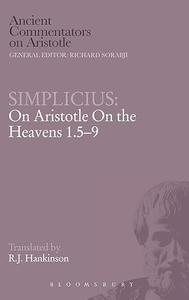
Free Download Simplicius Of, R J Hankinson, "Simplicius: On Aristotle On the Heavens 1.5-9"
English | 2004 | pages: 192 | ISBN: 0715632310, 1472557425 | PDF | 0,8 mb
Aristotle argues in On the Heavens 1.5-7 that there can be no infinitely large body, and in 1.8-9 that there cannot be more than one physical world. As a corollary in 1.9, he infers that there is no place, vacuum or time beyond the outermost stars. As one argument in favour of a single world, he argues that his four elements: earth, air, fire and water, have only one natural destination apiece. Moreover they accelerate as they approach it and acceleration cannot be unlimited. However, the Neoplatonist Simplicius, who wrote the commentary in the sixth century AD (here translated into English), tells us that this whole world view was to be rejected by Strato, the third head of Aristotle's school. At the same time, he tells us the different theories of acceleration in Greek philosophy.
E-Books → Simplicius On Aristotle Physics 8.6–10
Published by: voska89 on 18-03-2024, 07:02 |  0
0
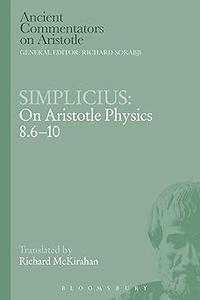
Free Download Richard D. McKirahan, "Simplicius: On Aristotle Physics 8.6-10"
English | 2014 | pages: 255 | ISBN: 1780938977 | PDF | 1,4 mb
Aristotle's Physics is about the causes of motion and culminates in a proof that God is needed as the ultimate cause of motion. Aristotle argues that things in motion need to be moved by something other than themselves - he rejects Plato's self-movers. On pain of regress, there must be an unmoved mover. If this unmoved mover is to cause motion eternally, it needs infinite power. It cannot, then, be a body, since bodies, being of finite size, cannot house infinite power. The unmoved mover is therefore an incorporeal God. Simplicius reveals that his teacher, Ammonius, harmonised Aristotle with Plato to counter Christian charges of pagan disagreement, by making Aristotle's God a cause of beginningless movement, but of beginningless existence of the universe. Eternal existence, not less than eternal motion, calls for an infinite, and hence incorporeal, force. By an irony, this anti-Christian interpretation turned Aristotle's God from a thinker into a certain kind of Creator, and so helped to make Aristotle's God acceptable to St Thomas Aquinas in the thirteenth century. This text provides a translation of Simplicius' commentary on Aristotle's work.
E-Books → Simplicius On Aristotle On the Heavens 2.1–9
Published by: voska89 on 18-03-2024, 07:02 |  0
0
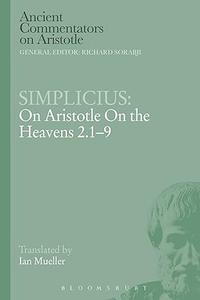
Free Download Simplicius Of, Ian Mueller, "Simplicius: On Aristotle On the Heavens 2.1-9"
English | 2004 | pages: 235 | ISBN: 0715632000, 1472557417 | PDF | 1,0 mb
Aristotle believed that the outermost stars are carried round us on a transparent sphere. There are directions in the universe and a preferred direction of rotation. The sun moon and planets are carried on different revolving spheres. The spheres and celestial bodies are composed of an everlasting fifth element, which has none of the ordinary contrary properties like heat and cold which could destroy it, but only the facility for uniform rotation. But this creates problems as to how the heavenly bodies create light, and, in the case of the sun, heat. The value of Simplicius' commentary on On the Heavens 2,1-9 lies both in its preservation of the lost comments of Alexander and in Simplicius' controversy with him. The two of them discuss not only the problem mentioned, but also whether soul and nature move the spheres as two distinct forces or as one. Alexander appears to have simplified Aristotle's system of 55 spheres down to seven, and some hints may be gleaned as to whether, simplifying further, he thinks there are seven ultimate movers, or only one.
E-Books → Simplicius On Aristotle Categories 7–8
Published by: voska89 on 18-03-2024, 07:02 |  0
0
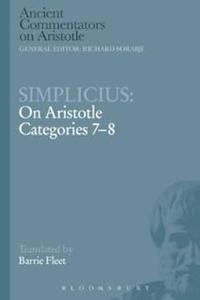
Free Download Senior Classics Master and Director of Studies Barrie Fleet, "Simplicius: On Aristotle Categories 7-8"
English | 2002 | pages: 241 | ISBN: 0715630385, 1472557344 | PDF | 2,3 mb
In Categories chapters 7 and 8 Aristotle considers his third and fourth categories - those of Relative and Quality. Critics of Aristotle had suggested for each of the non-substance categories that they could really be reduced to relatives, so it is important how the category of Relative is defined. Aristotle offers two definitions, and the second, stricter, one is often cited by his defenders in order to rule out objections. The second definition of relative involves the idea of something changing its relationship through a change undergone by its correlate, not by itself. There were disagreements as to whether this was genuine change, and Descriptioninus discussed whether relatives exist only in the mind, without being real. The terms used by Aristotle for such relationships was 'being disposed relatively to something', a term later borrowed by the Stoics for their fourth category, and perhaps originating in Plato's Academy. In his discussion of Quality, Aristotle reports a debate on whether justice admits of degrees, or whether only the possession of justice does so. Simplicius reports the further development of this controversy in terms of whether justice admits a range or latitude (platos). This debate helped to inspire the medieval idea of latitude of forms, which goes back much further than is commonly recognised - at least to Plato and Aristotle.
E-Books → Rereading Aristotle's Rhetoric
Published by: voska89 on 18-03-2024, 06:42 |  0
0
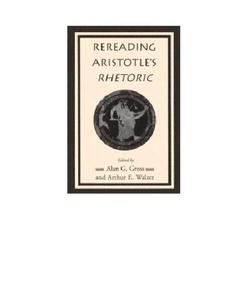
Free Download Rereading Aristotle's Rhetoric By Alan G. Gross, Arthur E. Walzer
2008 | 251 Pages | ISBN: 0809387239 | PDF | 2 MB
In this collection edited by Alan G. Gross and Arthur E. Walzer, scholars in communication, rhetoric and composition, and philosophy seek to "reread" Aristotle's Rhetoric from a purely rhetorical perspective. So important do these contributors find the Rhetoric, in fact, that a core tenet in this book is that "all subsequent rhetorical theory is but a series of responses to issues raised by the central work."The essays reflect on questions basic to rhetoric as a humanistic discipline. Some explore the ways in which the Rhetoric explicates the natur.
E-Books → Philoponus On Aristotle Posterior Analytics 1.1–8
Published by: voska89 on 18-03-2024, 06:07 |  0
0
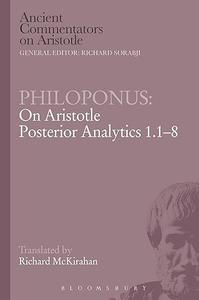
Free Download Philoponus, Michael Griffin, Richard Sorabji, "Philoponus: On Aristotle Posterior Analytics 1.1-8"
English | 2014 | pages: 192 | ISBN: 1472558189, 0715636677 | PDF | 1,1 mb
Aristotle's Posterior Analytics elaborates for the first time in the history of Western philosophy the notions of science and the requirements for the distinctive kind of knowledge scientists possess. His model is mathematics and his treatment of science amounts to a philosophical discussion, from the perspective of Aristotelian syllogistic, of mathematical proofs and the principles they are based on. Chapters 1-8 expound the foundations of Aristotle's theory, pointing out the similarities and differences between scientific knowledge and other types of knowledge, establishing the need for basic principles, and identifying the types of principles and the source of necessity associated with scientific facts. Philoponus' massive commentary, the most complete ancient discussion of Posterior Analytics Book 1, offers uniquely valuable testimony to the way this book was read and understood in late antiquity, as well as providing information on earlier interpretations. Of particular interest is Philoponus' account of scientific principles, which is based not only on Aristotle but also on the Greek mathematical tradition, especially Euclid and his commentator Proclus.
E-Books → Aristotle on Ontological Priority in the Categories
Published by: voska89 on 17-03-2024, 19:12 |  0
0
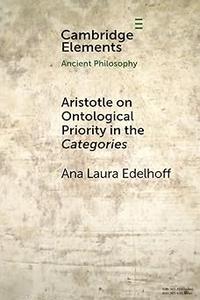
Free Download Ana Laura Edelhoff, "Aristotle on Ontological Priority in the Categories "
English | ISBN: 1108812724 | 2020 | 84 pages | PDF | 12 MB
The main objective of this Element is to reconstruct Aristotle's view on the nature of ontological priority in the Categories. Over the last three decades, investigations into ontological dependence and priority have become a major concern in contemporary metaphysics. Many see Aristotle as the originator of these discussions and, as a consequence, there is considerable interest in his own account of ontological dependence. In light of the renewed interest in Aristotelian metaphysics, it will be worthwhile - both historically and systematically - to return to Aristotle himself and to see how he himself conceived of ontological priority (what he calls 'priority in substance' [proteron kata ousian] or 'priority in nature' [proteron tēi phusei]), which is to be understood as a form of asymmetric ontological dependence.
E-Books → The History of Hylomorphism From Aristotle to Descartes
Published by: voska89 on 13-03-2024, 18:12 |  0
0
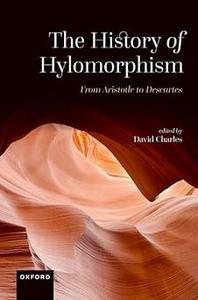
Free Download David Charles, "The History of Hylomorphism: From Aristotle to Descartes"
English | ISBN: 0192897667 | 2023 | 432 pages | PDF | 3 MB
Although Aristotle was not the first to understand objects in terms of their matter and their form, the account he developed has exercised a major influence on Western philosophy to this day. The History of Hylomorphism: From Aristotle to Descartes collects sixteen essays by experts that consider aspects of the first two thousand years of the history of hylomorphism, starting with Aristotle's immediate successors and ending with Descartes. It includes discussions of Hellenistic, Roman, Arabic, medieval, and early modern philosophers, examining the ways in which Aristotle's central ideas and concepts were progressively modified by these thinkers. Hylomorphism, as we understand it today, owes much to the way in which it was interpreted, and re-interpreted, during this period. Through a study of their work we can see how questions in contemporary metaphysics and philosophy of mind, such as Descartes's mind-body problem, came to be formulated.
E-Books → Body and Soul Essays on Aristotle's Hylomorphism
Published by: voska89 on 13-03-2024, 03:53 |  0
0
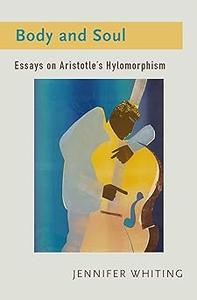
Free Download Jennifer Whiting, "Body and Soul: Essays on Aristotle's Hylomorphism"
English | ISBN: 0197666000 | 2023 | 328 pages | EPUB, PDF | 956 KB + 26 MB
Body and Soul: Essays on Aristotle's Hylomorphism is one of three volumes collecting previously published essays by Jennifer Whiting. This volume contains two sets of essays, one centered on Aristotle's account of an animal's body as standing to its soul as matter (hulê) to form (morphê), the other exploring Aristotle's conception of practical reason as the proper form of human desire.
E-Books → Aristotle on Method and Metaphysics by Edward Feser PDF
Published by: Emperor2011 on 8-03-2024, 16:48 |  0
0

Aristotle on Method and Metaphysics by Edward Feser PDF | 2.16 MB
N/A | 313 Pages
Title: N/A
Author: N/A
Year: N/A



